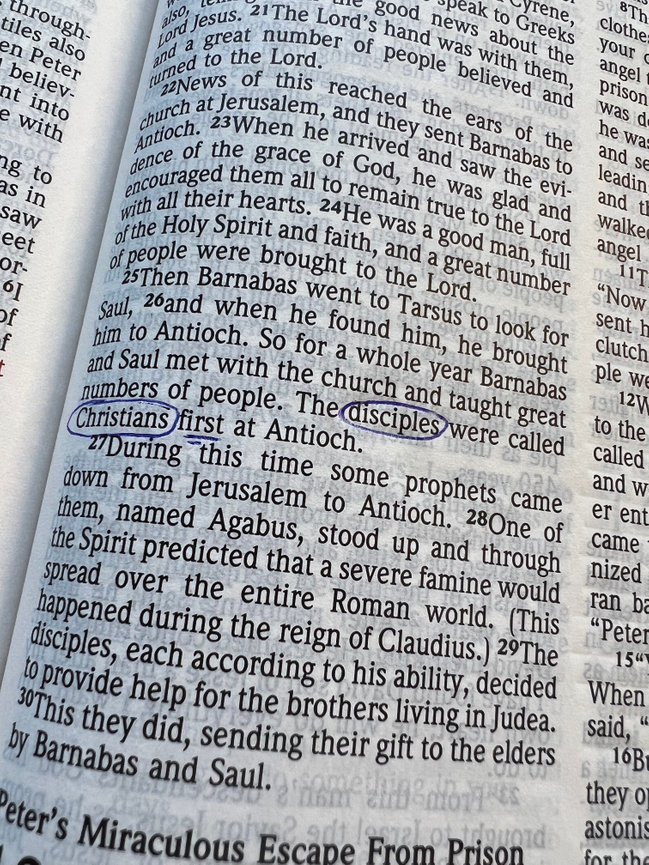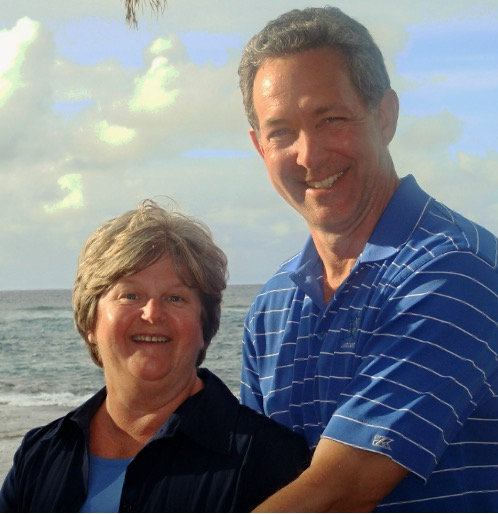Introduction
About forty years ago, five years into the life of the Boston Church of Christ (https://www.bostonchurch.org) and its many mission plantings in our fellowship of the International Churches of Christ, Pat Gempel created a women's anthology, written by women on the front lines of faith, entitled The Upward Call.
Last year, Pat and her friend Amanda Frumin were inspired to republish this volume, with two main goals in mind: to issue once again an Upward Call for Christian women to be actively engaged in teaching one another the principles of Biblical discipleship to Jesus and spiritual formation; and to raise money for the Philadelphia-based youth camp, Camp Hope for Kids, (https://www.hopeforkids.org/programs) a life-changing place of miracles for young people.
Chapter Three: The Path to Discipleship
by Joyce Arthur
Who Is a Disciple?
Jesus gave us direction in Matthew 28:18-20: “Then Jesus came to them and said, ‘All authority in heaven and on earth has been given to me. Therefore, go and make disciples of all nations, baptizing them in the name of the Father and of the Son and of the Holy Spirit and teaching them to obey everything I have commanded you. And surely, I will be with you always, to the very end of the age.’”
“Making disciples” of Jesus and “teaching them to obey everything I (Jesus) have commanded” is our mission. His church is made up of “disciples of Jesus.” John 3:16 and 2 Corinthians 5:11-21 tells us He wants all people to be reconciled to him, because He loves us so much. He promises in Matthew 28:20 “to be with us always, to the very end of the age.” He wants us to do his will on earth as it is done in heaven (Matthew 6:10). To spend eternity with God and other disciples we must be a disciple of Jesus. So: “What is a disciple and how does a person become a disciple of Jesus?”
Let us first understand the difference between the words, “disciple” and “Christian.” The Bible teaches that disciples were first called Christian (Christ-like) at Antioch, Acts 11:26. Prior to that time, everyone who had made Jesus Lord of their life was known as a disciple of Jesus or simply, a disciple. In fact, the word “Christian” appears only three times in the New Testament. The word “disciple” appears nearly three hundred times. In virtually every case, it refers to one who follows Christ and can be used interchangeably with the word “Christian”. Exceptions occur when the word “disciple” refers specifically to the twelve apostles, as in Matthew 11:1, or to the followers of John the Baptist in John 1:35. Whenever “disciple” is used in a general sense, however, the word “Christian” can be accurately substituted. Therefore, our title could be rephrased, “The Path to Discipleship.”

Living Examples
With this clarification, we can think more seriously about the answer to the question, “What is the path of discipleship?” A disciple of Jesus is not just a student of Jesus, a learner, as some believe. A disciple is one who takes on the lifestyle of the Master. Evidently, the early disciples of Jesus imitated his teaching as best they could. This practice caused the general population to call them “Christians”—people who were Christ-like. Discipleship is not something just learned in the mind, but something lived out in a life. It is more than learning what the teacher says, it is becoming a reproduction of the teacher. As the apostle Paul stated in 1 Corinthians 11:1, “Follow my example as I follow the example of Christ.”
We are told by people of the world today that the morals or lifestyle of a teacher have nothing to do with his effectiveness in the classroom. This is not true of the disciple of Jesus. An older woman who is unchaste and browbeats her husband at home cannot go to a Bible study and teach the younger women as she should. Consider Paul’s advice to Titus on this subject in Titus 2:3-5: “Likewise, teach the older women to be reverent in the way they live, not to be slanderers or addicted to much wine, but to teach what is good. Then they can train the younger women to love their husbands and children, to be self-controlled and pure, to be busy at home, to be kind, and to be subject to their husbands, so that no one will malign the Word of God.”
A disciple is a person who is dynamic, one who grows step by step into the likeness of the Master, Jesus. Discipleship is not a static condition but an ongoing process. The one who is discipled should learn to become a discipler. In Matthew 28:18-20, Jesus said that disciples should be made and then taught to obey everything Jesus had commanded. Thus, an endless chain is forged. Christians commit the gospel to faithful people who will teach others also (2 Timothy 2:2). A disciple disciples a person who disciples a person who disciples a person, ad infinitum.

The path to discipleship
Jesus said that “if any man would come after me, he must deny himself and take up his cross and follow me” (Matthew 16:24). There are two stages in becoming a disciple. The first is a surrender to the lordship of Christ (a decision to commit to imitating Jesus’s commitment to God), having your sins forgiven and receiving the gift of the Holy Spirit through immersion baptism (Acts 2:38ff); i.e., self-renunciation and a surrender to the lordship of Jesus. The second is following the example of Jesus and becoming like Him. The goal is for a disciple to reach maturity in Christ.
This chapter is concerned with the first stage -- becoming a Christian or disciple of Christ and beginning the process of discipleship. In Ephesians 2:12, people who are not disciples of Christ are described as “without hope and without God in the world.”
Christians are commanded to “make disciples.” The most effective way is to study the Bible and become friends. We need to understand one another. Sharing our lives, how we found the Lord and what we went through along the way is very effective. A personal discussion with a disciple of Jesus and the Word of God are powerful life-changers. Sharing how much Jesus means to me and how much God and Christ love all of us is more life-changing than handing out an impersonal tract about how to become a disciple of Jesus.
Becoming a disciple of Jesus
How to become a disciple of Jesus? God’s Word provides us with the only acceptable answer to this question. The process of becoming a disciple of Jesus Christ is illustrated in every example of conversion in the book of Acts. The Ethiopian eunuch (Acts 8:26–35), an important government official and a deeply religious man, is one of the simplest and clearest examples of conversion. God responded to this man’s efforts to seek the truth by sending Philip the evangelist to guide him in his search for God.
The opening scene of the story shows the eunuch riding along in his chariot and reading Isaiah 53:7–8, while on his way home from worshipping in Jerusalem. Philip approached the chariot and asked the eunuch if he understood what he was reading. The Ethiopian then invited Philip to get into his chariot and explain the scripture. Philip used the Isaiah passage, which prophesied the coming of Jesus and his ministry, as a text for preaching about Jesus. After hearing Philip’s message, the eunuch requested baptism and Philip baptized him. The eunuch thus became a disciple of Jesus. Evidently, the eunuch himself became a discipler as Christianity soon took root in Ethiopia and began to grow.
As we read other accounts of conversion in the book of Acts, it becomes clear that the gospel was taught, open hearts accepted it as true, and people turned from living for themselves to serving Jesus as the Lord of their lives. They gladly proclaimed their faith in him, completing their obedience by being born again of water and the Spirit (Acts 2:38–41). They became disciples who, in turn, became disciplers.
A more detailed study of the conversion process reveals five essential concepts to be grasped and implemented if one is to become a disciple. God has given us all the information we need regarding how to be saved, i.e., become a disciple (2 Peter 1:3). Each person must hear the Word; believe it and develop a faith and trust in God; repent by turning to God and making Jesus the Lord of his life; publicly confess Jesus as Lord and the Son of God and be immersed in water for the forgiveness of his sins, the consummation of the new birth. The Holy Spirit will then be given to the new Christian who has now become a disciple of Christ and a new creation. As we explore those concepts one by one, please remember that we must be obedient to all of God’s teachings, 2 Timothy 3:16-17.
Hear.
We must first hear the message before we can respond to it. That basic fact is clearly expressed in Romans 10:14, “How then can they believe in the one of whom they have not heard? And how can they hear without someone preaching to them?” Verse 17 describes the result of hearing: “Consequently, faith comes from hearing the message, and the message is heard through the word of Christ.” We can conclude that there are two major ways to hear about God: through reading his Word on our own and by having someone teach it to us. For instance, we can be taught by attending church or a group Bible study and by personally reading the Bible with a friend. The outcome of hearing is the development of our faith, which brings us to the second element.

Believe.
The most important requirement in becoming a disciple is our faith. After hearing God’s Word, we must come to firmly believe it. Everything we do from this point on will stem from our belief or faith. We have heard and we must believe that “God so loved the world that he gave his one and only Son, that whoever believes in him shall not perish but have eternal life” (John 3:16). Eternal life cannot be attained without believing that Jesus is the Son of God and that he was sent into the world for us.
Repent.
One indication of a saving faith is a willingness to repent. We know that sin separates us from God and that if we die in our sins, we will be eternally separated (Isaiah 59:1–2). Therefore, we must learn how to repent of our sinful ways. In Greek, the word “repent” means “to turn.” The Bible teaches us that if we are to be saved by God, we must continually change to be like Christ. This includes eliminating negative behavior from our lives (sin = actions Christ never had), and adding positive traits personified in Jesus, such as love, joy, peace, patience, and self-control (Galatians 5:22).
Repentance is essential for forgiveness by God. Luke 13:3–5 twice states that “unless you repent, you too will all perish.” That is a reasonable requirement. In our day-to-day lives, we do not expect our friends or families to forgive our wrongs until we repent and change our actions. In a similar way, God expects repentance that is proven by deeds (Acts 26:20). Does that mean we are saved at the point of repentance? No. 2 Corinthians 7:8–11 describes Biblical repentance and verse 10 states that “godly sorrow brings repentance that leads to salvation and leaves no regret.” Repentance, then, is necessary for salvation but is not the only requirement.
Confess.
If we are truly living in faith, we will be willing to confess Jesus as Lord. Others need to know that we are going to live a life like Christ’s. Romans 10:9 teaches “that if you confess with your mouth, ‘Jesus is Lord,’ and believe in your heart that God raised him from the dead, you will be saved.” Here we see that an outward confession as well as an inward belief are prerequisites to our salvation. Hearing and believing, however, are not optional. 2 Timothy 2:19 states that “everyone who confesses the name of the Lord must turn away from wickedness.” Confession and repentance are specifically and essentially linked together.
Be Baptized.
Another natural response to a living faith is the willingness to obey God in baptism. Acts 2:36– 42 describes a group of people who have just come to a complete faith in Jesus Christ. They have realized that he is the Son of God and that their sins were responsible for putting Christ on the cross. Their spontaneous response was: “When the people heard this, they were cut to the heart and said to Peter and the other apostles, ‘Brothers, what shall we do?’” That is a powerful example of living faith. The people believed so strongly that Jesus died for them that they wanted to respond to him. “Peter replied, ‘Repent and be baptized, every one of you, in the name of Jesus Christ, so that your sins may be forgiven, and you will receive the gift of the Holy Spirit.’” Again, we find the command to repent of sins. In addition, the people are instructed to be baptized for the forgiveness of their sins and to receive God’s indwelling spirit. Baptism is the point at which our sins are forgiven, a crucial step in conversion since it is sin that keeps us separated from God.
How does this work? Why does going down into a pool of water result in the forgiveness of our sins? Romans 6:2–4 illustrates what happens during baptism. It is at that moment that we are sharing in the death, burial and resurrection of Jesus Christ. We are dying to our sins, repenting, and burying them in the waters of baptism, where God, by faith, washes them away (Acts 22:16). We are beginning a new life. We have truly acted out of obedience and now are in a right relationship with God, free from our past slavery to sin.
When our sins are forgiven, we receive God’s spirit, which gives us the power to change and become like Christ. Water baptism consummates the new birth. Said another way, it was God’s plan and the beginning of our submission to Him. He doesn’t need to explain why He did it this way, we just need to obey.
Why shouldn’t I become a disciple of Jesus?
Now let’s look back at the Ethiopian eunuch in Acts 8:36. At this point, he knows what is necessary to become a disciple and is ready to decide. His question, “Why shouldn’t I be baptized?” is a common and very important question. Everyone should stop and think about the costs and benefits involved in this crucial decision and weigh them prior to taking action.
A thorough cost analysis is recorded in Luke 14:25-27. “Large crowds were traveling with Jesus, and turning to them, he said, ‘If anyone comes after me and does not hate his father and mother, his wife and children, his brothers and sisters -- yes, even his own life -- he cannot be my disciple. And anyone who does not carry his cross and follow me cannot be my disciple.’” Jesus here spoke of things we must understand before becoming disciples. We must be willing to put God first in our lives, before our families, our friends and even ourselves (sometimes the most difficult of all). Matthew 10:37–38 makes the same statement, telling us that we must put God first, ahead of all others we love.
Christ did not give us those commands to make our family relationships suffer. My own experiences have proven to me that his commands improve those relationships. Before I became a disciple, my family and I were not close, and I feel primarily responsible for the separation between my mother and me. After I decided to put God first in my life, I started to see things drastically change with my mother. I followed God’s Word in loving and respecting her, accepting her life and efforts, and showing my appreciation to her with supportive words and actions. Now I enjoy a very special and meaningful relationship with my mother because of my devotion and obedience to God. I have seen this also change my relationship with my husband, sisters, and brothers as I grow in my life as a Christian. Putting God first can improve all areas of our lives, especially as we strive to die to our own will and put God’s will into action. Before we can become disciples, we must be willing to make Jesus the Lord of every area of our lives.
Luke 14:28–30 further explains why we must consider these things before we can be Christians. Jesus used the illustration of a man building a tower. If the person building does not estimate the cost of the project before he begins it, he may find that he cannot complete the project and consequently onlookers would ridicule him, saying, “This fellow began to build and was not able to finish.” Before beginning to build our lives as Christians, we also need to consider as much as possible of what will be involved. When individuals start on this path without committing to grow and to continue for the rest of their lives to follow the Lord, they may be in danger of leaving God. Leaving God is serious and hurts the individual and the church (Hebrew 6:4–6, 2 Peter 2:20–22). God is able to keep us strong if we pray and keep on trying.
Why should I become a disciple?
With all those costs in mind, why would anyone want to become a Christian? The Ethiopian eunuch, knowing the price he had to pay, still decided to commit his life to God. He believed that Christ was God’s son, committed his future to God and was quickly baptized for the forgiveness of his sin and to receive the gift of the Holy Spirit to guide his future. He enthusiastically began his life as a disciple of Jesus. Why?
How else do you have your sins forgiven, receive God’s Spirit to help you live the rest of your life on earth, and have eternal life in the presence of God, Christ, the Holy Spirit, enjoying perfect love, joy and peace? How else do you escape the influence of Satan and his demons? How else do you escape eternal separation from God?
Will there be trouble in this life? Yes. Your troubles will help you grow in your faith if you pray and call on God for answers. John 6:60–69 describes a time when it was getting difficult to follow Christ, and many people began turning away from him. Verses 67–69 record Peter’s conclusion: “Lord, to whom shall we go? You have the words of eternal life. We believe and know that you are the Holy One of God.” Peter reasoned that though it may be hard to follow Jesus at times, the benefit of eternity with God far surpasses the benefits of anything else. With that reasoned conclusion, one won’t need any more persuasion to follow Christ. God is love. Without God we are lost.
One last verse that is an encouragement for us to follow the Lord is John 10:10, where Jesus promised “I have come that they may have life and have it to the full.” My life as a Christian is fuller than any other life I could have chosen. Notice the Ethiopian’s attitude after obeying God’s command to commit his life to Christ and be baptized -- he went on his way rejoicing (Acts 8:39).
Summary
We have looked at many verses from God’s Word that enable us to answer the question we began with: “What is the path to discipleship?” God has made an answer possible through his perfect plan for each of us to become a disciple and then go on to help those near and dear to us to have the same opportunity. The question, “How Can I?” was answered by outlining the five essential elements of conversion: hearing the Word, faith, confession, repentance, and baptism. Many more verses than those cited in this article can be found to further support each topic discussed. Any personal questions you may still have can be answered by continuing to study God’s Word. After a thorough search of the scriptures, I believe most people will reach the same conclusion as Simon Peter: there is nowhere else to go but to the Lord. “Why shouldn’t I become a disciple of Jesus?” There is no logical reason why you should not. Truly, God loves all of us and wants us to be with Him for eternity – even you and me.

Joyce Crosby was born in Concord, Massachusetts in 1959. In 1977 she graduated from Concord-Carlisle High School and headed to Vanderbilt University to study nursing. God changed her plans in June of 1979 when she studied the Bible and made Jesus Lord, after being reached out to by her high school sweetheart, Douglas Arthur. She transferred to Boston University to complete her degree and she and Douglas were married in 1981. In 1982, as newlyweds, they went with eight others to begin the London Church of Christ. It was the first international Church planting sent out from the Boston Church of Christ.
In London, her leadership skills grew and so did the church and her family. Christopher and Jessica were born in Queen Charlotte’s Hospital in 1984 and 1985. The London Church grew over the next few years from its humble beginnings of 10 to more than a thousand members. It also began sending out churches built on those that became disciples in London. Teams were sent to Bangalore, India; Lagos, Nigeria; Singapore; Sydney, Australia; Birmingham and Manchester, England – these were the first launched church plantings out of London. Joyce helped convert, inspire, and support another generation of missionary women headed to the four corners of the globe.
In the early 1990’s, family health challenges led the Arthurs back to the United States to serve in Philadelphia, and then in Washington, DC, where they adopted their third child, Nathanael, from India at age 9. After more than a decade serving the church in DC, Doug and Joyce left the ministry and Joyce accepted a position as an Executive Director of an assisted living facility. In 2005, Doug accepted a position in Baltimore as a minister and Joyce rejoined him in the ministry. May of 2007 brought the Arthurs full circle, back home to Boston: a 25-year journey since being sent out as a missionary; a time of refreshment for the Arthurs and the Boston Church. God brought a time of encouragement and revival to a church that had given so much to so many. Joyce was confronted with a debilitating combination of Lyme disease and psoriatic arthritis which sent her into early retirement due to medical disability. From the challenges of being a visionary missionary as a young bride and mother to accepting the limitations that come with age and compromised health, she has stood the test. She recently shared at the fortieth anniversary celebration of the London church that she was “born to be a grandmother.” God has given her four grandchildren to lavish her love upon.
The Path to Discipleship
Response by Priya Deborah Nanjundan
Being asked to respond to Joyce Arthur’s chapter, “The Path to Discipleship,” has allowed me to reflect on my own spiritual journey and remind myself of God’s heart and His desire for EVERYONE to know and love Him. Doug and Joyce’s faith to move to the UK forty years ago, to plant the London Church and serve as missionaries, has blessed many in turn with faith, hope, and love for eternity. Their efforts have had a huge impact in my own personal walk with God. Both of my parents were converted in the 1980’s as campus students. Douglas studied the bible with my dad and officiated at my parents’ wedding in Mumbai, India, while my parents served in the full-time ministry in the 1990’s. After a brief time in the United States, sixteen years later, my family and I moved back to the UK. I studied the bible in the UK and in my teen years became a disciple.
The journey to getting on the path to discipleship is unique for everyone and accessible to anyone who desires to seek a relationship with God, our creator. When we examine God’s word, we see that the call to discipleship is the same for every believer. We are called to love God and love people (Matthew 22:34-40), to deny ourselves, to carry our cross (to grow to be more like Jesus) as we follow Him (Luke 9:23-25).
My journey in knowing God started at a young age and continues now. I was adopted from an orphanage in New Delhi, India, when I was three months old. I knew nothing about my biological family. I only knew that an old lady took me to the orphanage. As I have often told myself, all hopes and dreams for my life had come to an end – what could be more heartbreaking than to be given away by the people who should love you most? I now believe that God’s hopes and dreams for my life had just begun.

I was blessed to be adopted into a family of disciples. My parents have worked in the secular world, HOPE worldwide, and in the full-time ministry. By the time I was 15, I had lived in four countries, studied in ten different schools, and learned four languages! I consider myself lucky and am grateful to have experienced different cultures, to connect and engage with people from all walks of life.
My path to discipleship started young. I grew up in the church. I learned from my parents and others in the church. We had family devotionals on a weekly basis. I was taught not only to love God’s word, but to live it. For me, I didn’t ask if I should ever become a disciple, but “What is holding me back from being a disciple?”
The two things I had to work through were worldliness and people-pleasing. I deeply desired to experience the world before I became a disciple of Jesus. I was confused by the choice God gives us. He created us with free will. He wants us to make a conscious decision to follow Him. I feared missing out on living life when I wouldn’t be in control of my future. I felt being a disciple would restrict my freedom. I also wondered who I was becoming a disciple for. In my heart I knew that my parents’ prayer had always been for me to know God and have a relationship with him.
I studied the Bible for three years and twice all the way through. It took time for my heart to be humbled and to know that God loves me. He also calls me to a standard of godliness and righteousness. He wants me to grow to be more and more like Him, for my mind and heart to be focused on being godly, righteous, and eternal things – not on temporal and earthly things. Once I allowed the scriptures to transform my heart and trust God’s wisdom, plan, and timing, it didn’t take me long to be convinced that I needed to be right with God. I made up my mind to let the scripture transform my heart, to mature and grow in my faith, to grow in my knowledge of scripture, to love and serve people around me and trust that God knows what is best for me.
I’ve been a disciple for 13 years now – and I know it is because of God’s faithfulness! There are hopes and dreams in my life that are deferred for now. God has taken me on adventures and blessed me in ways I would have never imagined. I was able to graduate from my dream university studying the degree I wanted. I was blessed with the opportunity to serve in campus ministries in the United Kingdom and the United States and continue to serve in the ministry, full time. I have built friendships that are God-focused, self-less and filled with laughter and fun. I am grateful for the path of discipleship God has chosen for me. It is rooted in His love, it allows me to persevere and pick myself up when I fall, because of His grace. I wait in anticipation of the ways God will continue to work in my life. I put my hope and trust in Him. He is our creator.

Priya Deborah Nanjundan was born on 27 May 1993, in New Delhi, India. She was baptised and became a disciple on 5 July 2009, in the London International Church of Christ as a teen. She has served in the full-time ministry for over six years in campus ministries in the United States and the United Kingdom. Her parents recently retired from full-time ministry but continue to serve the London church as elder and women’s minister, and her brother is part of the Young Professionals’ ministry in the Glasgow church. She graduated from Goldsmiths College, University of London with a degree in Sociology (BA Honours). She loves to sing, read, travel, cook and watch movies.


Leave a comment
2 Comments
Apr 21, 2023, 2:04:44 PM
Jacqui F - Awww it fills my heart to the brim to see Joyce & Priya share, what the call to discipleship means to them, on the same platform. Doug & Joyce came to London in response to that call & 40 years later here is Priya a product of your faith (& many many more of us in London, outside London & from London to the wider world) expressing hers.
Mar 16, 2023, 8:15:48 AM
Pat Gempel - Joyce and Priya did such a great job. The team at womentoday.international made this happen. I praise God for everyone. May the Holy Spirit fall fresh on all those that helped to make this happen. Thank you for our wonderful, God inspired fellowship. Love, Pat Gempel